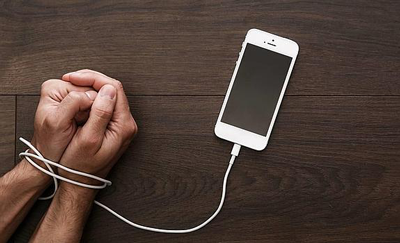Did you know that the average amount of time an American teenager spends looking at the screen of their cell phone is 8 hours? To put that into perspective, that is the same number of hours the average adult spends at work. I don’t think we need to convince anyone reading this that 8 hours per day on a cell phone is excessive.
The effects on the body and mind are severe. And to no one’s surprise, these effects are not positive. A myriad of mental health issues always manifests themselves in cell phone-addicted teens. High anxiety is one of the most common, as is depression. Teen suicide rates have escalated in the digital age and have virtually coincided with the growing acquisition rate and societal dependence on mobile devices.
Not every correlation implies causation, of course. But in this case, there is enough evidence to safely attribute a large amount of the modern increases in teenage mental health issues to cell phone addiction. if the sound of a notification alert on your own cell phone is difficult to resist, for most teens it’s almost impossible.
The average teenager constructs the lion’s share of their self-image through social media, attributing the amount likes, shares, views, and retweets they receive to their self-worth. Aside from the fact that social media is designed to be as addictive as possible, teenagers have a harder time than any other age group resisting the pull of their glowing screens as their devices have become the primary way they interact with their friends and with the world. This is not ideal, but it remains the current reality.
Bullying has also ramped up in frequency and intensity since the advent of the personal cell phone and all of its networking capabilities. It’s much easier for people to spout obscenities, insults, and vengeful remarks – remarks that they would almost never verbalize in person – from the comfort and safety of their bedroom using their cell phone.
A 2017 study showed that almost 60% of teenagers in the country have experienced online or physical harassment, almost 15% of whom said the harassment was severe. To put that into perspective, that’s about the same percentage of American high school kids who graduate. The more addicted a teen is to their phone, the more likely they are to be part of these statistics.
So what can you do as a parent of a technologically-addicted teen to prevent them from developing undesirable and harmful behaviors? We have some suggestions.
1.
Let’s start with how your teenager is likely obtaining a cell phone in the first place – from you. Be wise about when to allow your children to have their own phone. A large number of studies have made it very clear that letting young children – or even pre-teens – have their own smartphone is not good.
24/7 internet access in the pocket of a young child will inevitably result in detrimental behaviors and habits. There are cell phones available that do not have internet access and have no app-downloading capabilities. Consider a device like that first. Wait until you feel it’s appropriate to purchase a smartphone for your teen.
2.
When you finally give your teen a smart device, educate them beforehand on the conveniences as well as the dangers of modern technology. Set boundaries for its usage and consider some degree of monitoring.
The road leading to cell phone addiction is not long. Make sure to provide your teen with tools (knowledge) before giving them free reign.
3.
Both young children and teenagers prefer structure, even they say or act like they don’t. Without any household or parental structure, kids feel unloved and disoriented. A framework of expectations alongside a consistent routine yields the best psychological results in young people.
Make sure that device usage in the home is incorporated into the way you regulate your home environment as a parent.
- Consider keeping cell phones out of bedrooms as a household rule so devices don’t affect sleep
- Consider setting time limits on usage in the home.
- Consider a no-devices-at-the-table rule to encourage conversation.
- Consider not allowing devices in the morning before school or before homework is completed after school.
Home standards like this help train the minds of everyone in the house that life goes on as usual without smartphones and that they are a luxury, not a necessity. Plus, addiction is associated with triggers. You don’t want your teen’s triggers to be “laying down in bed” or “stepping into my bedroom”.
4.
Remember that if you want to prevent your teen from becoming addicted, you must practice cell phone use in moderation to lead by example. If you’re glued to your phone for 8 hours a day, there’s no way your teenager is going to do anything but the same.
5.
Make sure that you are providing and encouraging healthy, active ways for your teenager to spend their time. When was the last time your teen built something? Read a book? Watched an educational film? Provided service for another person? Joined an
athletic team?
Try and foster an environment where more time is spent doing useful, responsible things and less time waiting for more likes to appear on a Facebook post. Plan family trips and activities. Replace device time with “real life-time”.
What interests does your teen have? Provide opportunities for them to have experiences related to their interests. This will disintegrate cell phone attachment as much as anything else.
6.
Don’t harass your teen with multiple texts and calls throughout the day to check up on them, constantly communicating your worry, hovering over their cell phone usage while they’re outside the home. Although to some, this may seem counterintuitive, you’ll make it harder on yourself by becoming a “helicopter parent”.
This communicates to your teen that you have no trust in them, do not respect their privacy, and don’t view them as capable to function in the world without you. Under these circumstances, your teen is likely to dive deeper into the world of their cell phone in an attempt to escape you.
No matter how troubled or addicted you teen is, they need to know that you love and trust them to make (or to eventually make) correct choices.your
7.
Don’t pay for it. If your teen wants a cell phone, require them to obtain one with their own money. Smartphones are not cheap nor are the data plans. Encourage responsibility by inviting them to get a job and pay for these things themselves.
Working for something you want is a life skill that they’ll have to learn eventually. They should learn this as early as possible. Teach them about going over on data usage and that they’ll have to pay more of their own money if they aren’t responsible. If they break their phone, don’t pay for it. If they want a case, don’t pay for it. Let them fund these things themselves.
Not only will you be giving them opportunities to learn and grow, you will decrease the chances of cell phone addiction by enhancing their maturity level.
8.
Turn off notifications. The “ding” that signals a notification on a cell phone is destroying the attention spans of young people around the world. They place the highest priority of any noise that their phone makes. Break this “twitch” (an addict’s obsession with checking their phone constantly) over time by turning off these audible alerts.
Consider even deleting apps that also have desktop versions. That way, your teen can check their Facebook notifications the next time they have computer access. They can’t fit a laptop in their pants pocket (not yet, at least).
9.
Give them responsibilities. We’re not just talking about common household chores, even though those are important. Give them responsibilities outside the box – things like choosing where the family should eat for dinner and make reservations, researching beaches for the upcoming family vacation and making itinerary recommendations, find an affordable hotel online where the family can stay on the way to your next trip to visit Grandma, picking younger siblings up from school, running errands, etc.
Look for teaching opportunities wherever you can find them, particularly if these opportunities will take them away from their cell phone. Remember that even if they push back when asked, in the end, these kinds of responsibilities will have a positive effect on them. You will be doing your job as a parent, even if they don’t recognize that.
You’ve noticed that many of these suggestions have a relationship to building maturity, offering trust, and providing real-world responsibilities. This is because cell phone addiction promotes idleness. Eliminating idleness and replacing it with fun, responsibility, and service is one of the best medicines for any addiction, including teenage cell phone addiction.

